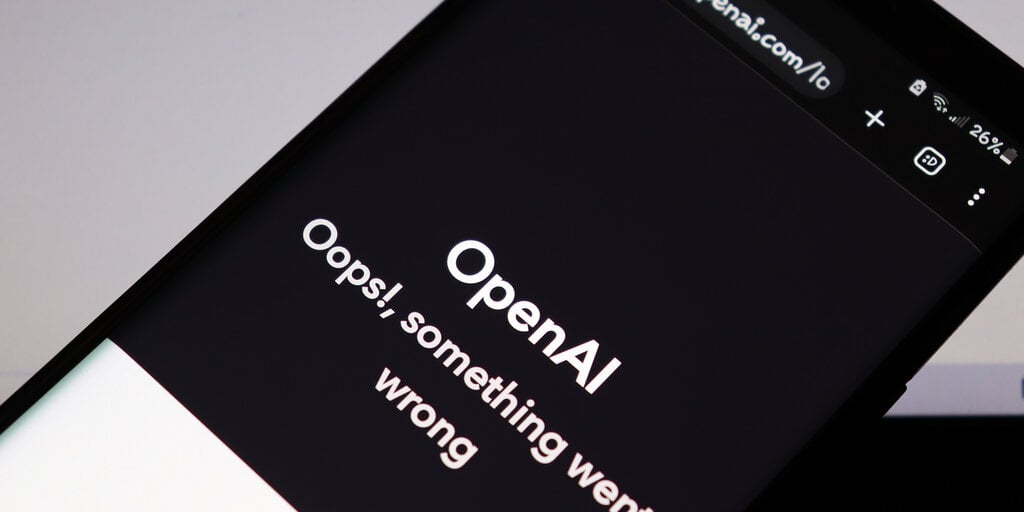
Stay on top of crypto news, get daily updates in your inbox.
- SEO Powered Content & PR Distribution. Get Amplified Today.
- PlatoData.Network Vertical Generative Ai. Empower Yourself. Access Here.
- PlatoAiStream. Web3 Intelligence. Knowledge Amplified. Access Here.
- PlatoESG. Carbon, CleanTech, Energy, Environment, Solar, Waste Management. Access Here.
- PlatoHealth. Biotech and Clinical Trials Intelligence. Access Here.
- Source: https://decrypt.co/205446/chatgpt-outage-openai-ddos-attack-russian-hackers
- :has
- :is
- :not
- ][p
- $UP
- 10
- 16
- 20
- 2021
- 2022
- 7
- 8
- a
- Able
- About
- Absolute
- access
- According
- added
- adding
- again
- against
- AI
- All
- allegedly
- am
- amount
- an
- and
- Anonymous
- answer
- any
- api
- ARE
- AS
- At
- attack
- Attacks
- attempt
- Bandwidth
- based
- battles
- BE
- because
- been
- before
- Beginning
- being
- blockchain
- blockchain industry
- blocking
- Bloomberg
- Bot
- bring
- by
- calling
- CAN
- Center
- Centers
- chatbots
- ChatGPT
- claimed
- coming
- comment
- Companies
- company
- CONFIRMED
- consumed
- continuing
- coo
- crypto
- Crypto News
- Cyberattack
- cybercriminals
- Cybersecurity
- daily
- Dark
- David
- DDoS
- DDoS attack
- dealing
- dealt
- Decrypt
- Denial of Service
- Devices
- DID
- different
- Disrupt
- Disruption
- distributed
- down
- dramatic
- due
- easiest
- emerged
- end
- enough
- equipment
- Errors
- Even
- explained
- external
- February
- filtering
- Firm
- Fix
- fixed
- flood
- For
- form
- from
- game
- get
- going
- Group
- hackers
- had
- Halborn
- handle
- Have
- he
- Hit
- HOURS
- http
- HTTPS
- identified
- if
- impacting
- implemented
- impossible
- improvement
- in
- industry
- Internet
- Interview
- investigation
- iot
- iot devices
- IP
- Israel
- issue
- IT
- ITS
- jpg
- July
- june
- just
- large
- later
- launched
- launching
- like
- Line
- lines
- linked
- locations
- Machines
- many
- May..
- midnight
- millions
- Mitigate
- more
- Move-to-earn
- Nature
- nearly
- network
- New
- news
- night
- normal
- Notice..
- now
- of
- on
- once
- OpenAI
- operation
- or
- orchestrated
- Other
- our
- Outages
- over
- overwhelming
- Pattern
- performance
- periodic
- phone
- phones
- ping
- plato
- Plato Data Intelligence
- PlatoData
- Popular
- Problem
- RE
- reached
- relative
- Reported
- Reporting
- Reports
- request
- resolved
- Respond
- responses
- responsibility
- router
- russian
- s
- Said
- same
- saw
- saying
- scene
- seeing
- seen
- September
- Series
- server
- service
- Services
- simply
- simultaneously
- since
- Solana
- Someone
- sporadic
- started
- Status
- Stop
- Sudan
- support
- Surrounding
- Swarm
- T
- taking
- Target
- targeted
- Telegram
- ten
- than
- that
- The
- their
- themselves
- they
- Think
- this
- this year
- those
- though?
- thursday
- time
- to
- told
- top
- traffic
- Tuesday
- two
- until
- Update
- Updates
- uptime
- User
- wait
- was
- Way..
- ways
- we
- Wednesday
- WELL
- were
- What
- which
- while
- with
- Won
- Work
- would
- Wrong
- year
- years
- you
- Your
- zephyrnet
More from Decrypt
Ethereum’s Vitalik Buterin ‘Very Hopeful’ Dogecoin Moves to Proof of Stake
Source Node: 1684124
Time Stamp: Sep 23, 2022
From Silk Road to Buying ETH: How Musician Tycho Went Crypto
Source Node: 1641999
Time Stamp: Aug 27, 2022
US Lawmakers Fear Cryptocurrency Could Be a ‘Financial 9/11’, Says Congressman
Source Node: 999791
Time Stamp: Jul 29, 2021
Beeple’s New NFT Push: ‘Iconic Moments’ From Sports, Pop Culture
Source Node: 941777
Time Stamp: Jun 24, 2021
India Central Bank Governor: Crypto Is ‘Big Threat’ to Financial Stability
Source Node: 1606941
Time Stamp: Feb 11, 2022
OnlyFans’ Ethereum Holdings Sank—But 2022 Was Still A Good Year – Decrypt
Source Node: 2239057
Time Stamp: Aug 27, 2023
Avalanche, Terra, ThorChain Hit by Midweek Market Slump
Source Node: 1865534
Time Stamp: Aug 26, 2021
Tokenized Coinbase Stocks Are Coming to Polygon Thanks to Backed Finance – Decrypt
Source Node: 2201215
Time Stamp: Aug 8, 2023










